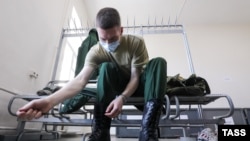On February 28, Russia’s state-owned RIA Novosti news agency reported that Russia’s Defense Ministry denied using conscripts in the war on Ukraine.
“The Russian Defense Ministry stated that only officers and contractors are participating in the military operation in Ukraine,” RIA Novosti said on Twitter.
That is false, based on what some soldiers’ families are claiming.
The use of conscripts is controversial in Russia, where virtually all males between the ages of 18 and 27 must complete a one-year term of military service.
Those who enlist voluntarily are known as kontraktniki, or contract soldiers, and they typically receive more training, serve longer periods and get better pay and benefits.
Under Russian law, however, conscripts cannot be deployed outside of Russia.
The country’s military has long sought to replace the outdated system of using draftees, or conscripts, with an all-volunteer contract force. Russia’s military managed in recent years to increase the proportion of contract soldiers to conscripts.
On February 24, a day after Russia began pouring more forces into Ukraine, the Daily Beast reported that Russian conscripts had been threatened – even beaten – into signing contracts so that they could be deployed outside Russia.
As evidence, the news outlet cited a report in the Russian news publication Takie Dela sourced to the Committee for Soldiers’ Mothers, one of Russia’s oldest non-governmental groups, which works to protect the rights of Russian military personnel.
The committee reported that, in some cases, the status of entire military units was switched from conscript to contract soldier.
The soldiers had been told they were going to the border of Ukraine strictly for exercises and never fully informed of the true mission – a war – until the invasion began.
“There are facts of the use of physical violence, beatings of those who refuse to become contract soldiers. Further, complete uncertainty, as their phones are taken away,” Andrey Kurochkin, deputy chairman of the mothers’ committee told Takie Dela.
“We've had a flurry of calls from scared mothers all over Russia. They cry, they don't know if their children are alive or healthy,” Kurochkin said.
On February 25, the independent Russian media outlet Meduza confirmed that narrative after speaking to Russian parents whose sons were fulfilling their mandatory service but then were allegedly strong-armed into contract service.
Some conscripts were allegedly sent into Russian-occupied territory in Ukraine’s eastern Donbas region before being deployed to a base on the Russian side of the border near Kharkiv in Ukraine.
Meduza quoted one mother identified only as “Maria”:
“My son told me he couldn’t say anything, everything was bugged and they were taking people’s phones away. As for himself, he said ‘everything’s fine,’ but what does ‘fine’ mean when you’re not allowed to say anything? And how can everything be fine in a war? I’ve been crying, not eating, just sitting there numbly and watching TV.
“We have group chats just for the mothers of boys who are serving. And last week, one mother wrote, ‘Why are they sending conscripts? ’The next day, her son got punished by his commanding officer. How? Did they go into our chat and read it?’”
The practice of forcing conscripts to sign on as contract soldiers is not new.
In 2015, as Russia’s war in eastern Ukraine entered a lull, Russian conscripts reported being intimidated into signing contracts so they could be sent to Ukraine’s Donetsk and Luhansk provinces.
Also in 2015, the Ukrainian volunteer investigatory organization InformNapalm reported that Russian conscripts were forced to sign contracts despite not undergoing the normal battery of physical and psychological examinations for enlistees.
Since Russia escalated the war on February 24, videos have been posted online showing captured Russian soldiers, some disarmed by lightly armed or even unarmed civilians. In other cases, they are in custody of the Ukrainian authorities, either military or law enforcement.
In some of the videos, the Russian soldiers are seen calling their relatives in Russia and explaining their predicament.
Ukrainians have set up a website and telephone hotline that Russian parents can use to locate relatives who may have been fighting in Ukraine. Details on Russian casualties are difficult to ascertain.





